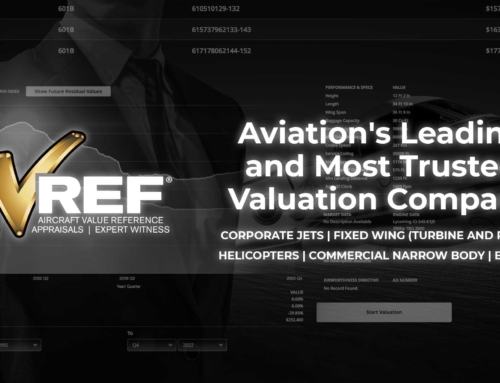There are thousands of aircraft transactions each year. If you are getting ready to buy or sell one, you probably have either engaged an appraiser or been told to by your lender. There are several reasons why lenders will ask you to get an appraisal completed before the bank will commit to your loan, but more on that later.
As you know, the condition of your aircraft determines its value, and sometimes it is beyond your control how the overall value is determined. For example, you could be based near the ocean, and your aircraft might sit outside, getting exposed to the salt air. Keeping your plane washed, clean, and dry and, hopefully, in this case, parked in a hangar would eliminate the salt.
Today, we’re taking a look at six issues that could affect your overall aircraft valuation so you can take action today.
Ready to learn more? Let’s get started.
Understanding Aircraft Valuation Factors
The American Society of Appraisers is a “multi-discipline, non-profit, international organization of professional valuers.” They cover a variety of industries, including jewelry, machinery, real estate, and aircraft, which is referred to as real or personal property.
Appraisers have to meet rigorous training requirements, including 120 hours of in classwork, numerous exams including an ethics exam, as well as completing the USPAP training and passing that test.
The ASA requires a thorough application be submitted, which includes a check on the applicant’s background (Those with Criminal histories or felonies are denied), education, and the number of years he or she has practiced appraising. Once these steps are completed, the appraiser is required to submit a written report which is scrutinized by the Board of Examiners. So when you see ASA next to someone’s name, trust me, it was earned.
ASA Appraisers will assess these values by following practices set forth by the Uniform Standards of Professional Appraisal Practice (USPAP).
For those looking to optimize the value of their aircraft, which conditions should they prioritize? Let’s take a look at a few ways your plane valuation could drop over time.
1. Records and Pedigree
An easy way to keep the value of your aircraft high is to stay organized. An appraiser really is scrutinizing the way you keep your files, logbooks, and any other aircraft documentation. We are looking to make sure that they are complete and that they are very well organized. Buyers will scrutinize them as well, so why not get them organized and scanned into your computer? After all, you can’t replace them once they are lost, and if you do have missing logs, you might as well kiss that valuation goodbye.
2. Airframe Condition
There are some things that get better and more refined with age. Unfortunately, most airplanes don’t fall into this category. The longer they’re in the air, the more susceptible they are to environmental hazards, corrosion, and massive scheduled maintenance events. If you want to ensure the value of your aircraft is as high as possible, then routine maintenance is a must. Still, there are some straightforward things you can do to keep the condition as pleasant as possible. Remember that once your plane has visible signs of corrosion, it’s too late. Keep your aircraft inside if possible, and always wash your aircraft and then, more importantly, dry it off.
Airframe programs are a great tool in assisting with the management of the airframes maintenance budget while at the same time providing a backstop for unscheduled expenses. You can even enroll in an airframe program if you own a piston aircraft.
3. Engine Condition
Most aircraft owners understand the dynamics between aircraft value and engine condition. However, surprisingly, there are still many operators overflying recommended TBO’s and worse yet trying to sell an aircraft with run out motors. It is one thing to prolong overhauls until there are no hours left to utilize. However, pushing that beyond the limit recommended by the manufacturer is nota wise decision or one that will generate top dollar for your aircraft. Overhauls, rebuilds, and remanufactured piston engines all have a different impact on value. Turbine engine operators are starting to forgo the power by the hour program on older aircraft, but be careful as that decision will have a substantial impact on your aircraft value.
4. Avionics and Cabin Technology
In terms of innovation, the aircraft industry is one of the most prolific and exciting industries in the world. Functional obsolescence is the phrase that aircraft owners dread. Keeping up with technology is nearly impossible with aircraft, as the cost in doing so will quickly outpace the value of the asset. The general rule of thumb is to find an aircraft with the avionics you desire already installed; that way, you won’t lose 40 cents on the dollar when you go to sell it. If you are getting ready to refurbish a 35-year-old business jet, think twice. That money will be better suited as a down payment on a new aircraft that will be cheaper to maintain in the long run.
When the cabin looks like it’s from the last decade, that means its time to upgrade. Like homes, the number one thing you can do to the inside of your aircraft is to enhance the fabrics and colors to reflect current trends.
5. Damage History
Appraisers reward diligence. That’s why it’s essential to keep thorough records the entire time you own an aircraft. Remember to keep them organized; you don’t want to be searching for paperwork when you need it.
You might keep your FAA-approved flight manual within arm’s reach, but some other materials to include:
- Engine and airframe logbooks
- Aircraft equipment list(s) and their upgrades
- Placards
- Weight and balance data
If you can’t provide these documents in an organized manner, it could it can be a red flag to a potential buyer. Who may not be able to research the airworthiness. Appraisers will want to see all of the documentation if damage did occur, so make sure you document everything. Take lots of photos of the damage and the repairs, and please keep the communication with the repair facility. Despite what many have read on the internet, damage to an aircraft is not a 45% reduction in value. Leave the diminution in value to the Senior Accredited ASppriaser, like a VREF Appraiser. If you try and recoup to much money, it will hurt your credibility if you are attempting to settle. Be prepared and get an appraisal if your aircraft suffered damage.
6. Maintenance
You should be able to provide clear records on your aircraft’s maintenance history,
Appraisers and buyers alike will expect a complete history of your aircraft. You should be able to supply total records and logs. In the coming weeks, VREF will be launching a new service to assist with logbook management. Stay tuned!
An Aircraft Appraisal You Can Trust
Are you looking to buy, sell, insure, or provide a loan for an aircraft? If so, it’s essential to understand its actual value before you move forward.
An aircraft valuation analysis can put crucial knowledge in your hands, allowing you to make an informed decision on how much a plane is truly worth.
When you’re ready to begin this process, we’d love to help.
We’re a team of appraisers, and in-house experts qualified to perform a complete aircraft analysis on your current or future investment. Contact us to learn more about what we do, and let’s take this next step together.




